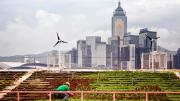The newly formed Harvard Global Institute (HGI) has announced that its first grant will go to China 2030/2050 (based at the Harvard Center Shanghai; see below)—$3.75 million for an interdisciplinary research project focused on climate change, sustainability, and greenhouse-gas emissions in China and globally. The project, led by Butler professor of environmental studies Michael McElroy and Morris University Professor of economics Dale Jorgenson, will receive $1.25 million annually for three years, an award that can be renewed for two more, officials said.
The launch of HGI, made possible through support from Wang Jianlin, chairman of the Beijing-based Wanda Group, a commercial-property and cinema-chain conglomerate, further expands the University’s global engagement. The new institute will provide large grants to projects involving teams of established faculty members tackling topics such as climate change, urbanization, education, water, and migration; smaller grants will be also be awarded to faculty members exploring more experimental topics. A committee will evaluate potential projects and make recommendations to President Drew Faust, who will make the final selection decisions.
“Having Harvard faculty, students, researchers on the ground in China, to help address some of the country’s most pressing needs, will be immensely beneficial,” Wang said in a statement. “And it is our hope that the discoveries the HGI enables will not only improve the lives of everyone in China, but also have applications around the world.”
China 2030/2050, based at the Harvard Center Shanghai, will focus on energy science, atmospheric chemistry, climate science, and engineering, and look as well at environmental health in national policy assessments, air quality, and climate law. Described by officials as a “major, cross-disciplinary effort,” the project will involve 17 faculty members from five Harvard schools, a similar number from Chinese universities, and as many as 100 students, visiting scholars, and postdoctoral fellows from both countries. McElroy said the new initiative represents an evolution of the long-running Harvard China Project, and will draw on a network of approximately 150 Chinese scholars who have studied at Harvard or collaborated with Harvard scholars as part of that project.
According to a University statement, the project—expected to start running “very quickly” this year, according to McElroy—will include research, public lectures, conferences, research symposia, a research-seminar series, policy consultations with decision-makers, public outreach, and a summer course in China for undergraduate and graduate students. HGI will also fund a project, led by professor of comparative literature and of East Asian languages and civilizations Karen Thornber, to better understand how communities in China—and populations worldwide affected by China’s ecological footprint—have grappled with pollution-related diseases.
“Today, knowledge is increasingly shared across national boundaries, and challenges must be understood in their broadest geographic context,” President Faust wrote in a letter to faculty members announcing the new institute and its inaugural grants. “In order to fully participate in an ever more connected world, Harvard must leverage its extraordinary intellectual and programmatic strengths with a more intentional strategy of engagement, ensuring the highest quality and impact for our teaching and research in the decades to come. One way in which I hope to achieve this important goal is with the creation of the Harvard Global Institute.”









